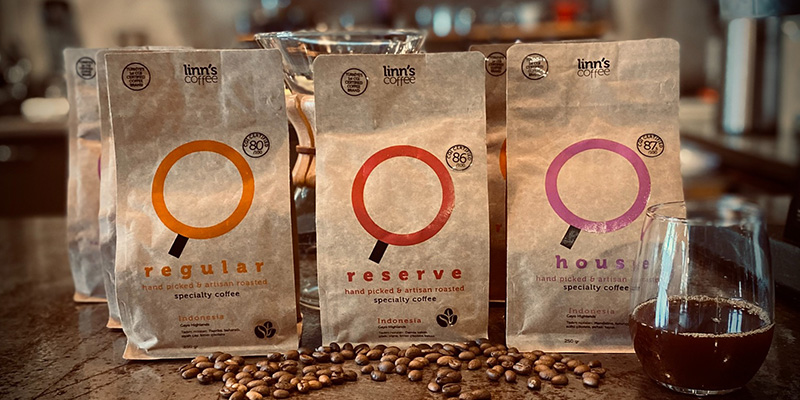
I remember that some of my Indonesian friends would get very upset, saying:
“Everyone knows about Bali, but they think it's a separate country."
These coffees hail from Sumatra, the largest island in Indonesia and the sixth largest in the world.
Indonesia is made up of about 17 thousand islands. It is home to rainforests. In some of its territories, there are tribes with gruesome rituals, living with spells and sorcerers who whisper to crocodiles. It is part of the Pacific Ring of Fire, where the majority of the Earth's volcanic eruptions and earthquakes take place. It is also home to fascinating underwater life. The Javanese living on the world's most populous island Java, believe that their island was the first place to be formed when the Earth came to be.
We bring our coffee beans from Gayo Highlands, the farthest northwest point of the country. The region takes its name from the indigenous people of Gayo who live there. The history of this region is quite different from the rest of Indonesia. It has been the region that has fought the longest against the colonialists. As they fought them, they asked for help from the Ottoman Empire. Those who came to fight ended up staying, which is why there is still a Turkish neighborhood at the center (unfortunately, in a poor condition) and a mausoleum for war heroes.
Its climate, altitude, volcanic soil structure, and unique coffee processing method make this region's coffee different from all the other regions of Indonesia and other coffees in the world.
I hope you enjoy these coffees coming from perhaps the most unchartered region of Indonesia.
- Single Origin
- Origin: Sumatra, Indonesia
- Region: Gayo Highlands
- Village: Tanoh Abu
- Cooperative: Gayo Farmers Cooperative
- Farmer: Priyanto Family
- Type: 100% Arabica, Catimor (Ateng)
- Altitude: 1000-1500 m.
- Processing method: Giling-Basah/Wet-Hulled
- A method unique only to this region in the world. Some experts consider this as the "single malt" of coffee. Click for details.
- Only ripe fruits are harvested by hand. After the fruits are separated from the beans (depulping), they are left in the fermentation tank overnight. Normally, no intervention is made to the beans until the humidity drops to 12%. In this process, however, the parchment and the pectin layer on the outside are stripped of the beans. They are then left to dry. Complex acidity and flavors appear as a result of this process.
- Harvest: November-May
- Grade: Double picked. Beans are checked twice for unripe and damaged fruits, which are sorted out.
- Tasting notes: Paprika, spicy, black tea, dark chocolate
- Degree of Roast: Medium (between first & second crack)
Degree of roast changes according to which aroma and flavors you want to reveal. If you’d like to read Emre’s article on roasting coffee, I’m leaving a link right here. (The article is in Turkish, by the way.)
- Roasted by Emre Bereket
- Emre Bereket's Recipe:
- You can use the same measurement for V60 and filter coffee machine.
- 20g of coffee, 320ml of hot water (93°C)
If you are using a V60 Dripper:
- Blooming:
- Pour 60ml of water (takes about 10-15s).
- Wait for 30s after pouring water (for expansion and degassing). Pour the remaining water (takes about 1m 20 s)
- Total brewing time 2m 30s.
Enjoy your cup of freshly brewed coffee!
You know how some people appear to have no hard corners, no sharp edges? They can get along fine with everybody.
They are easy to be around. When they listen, they do not just wait for their turn to speak or see it as an opportunity to unload on you what they know. They actually listen. Not because they don't have a stance of their own, but simply because they are gentle and tolerant.
This coffee is just like that. No sharp edges. It has a smooth taste that appeals to just about anyone and will make you want to say, "I'll have the usual".
- Single Origin
- Origin: Sumatra, Indonesia
- Region: Gayo Highlands
- Village: Tanoh Abu
- Cooperative: Gayo Farmers Cooperative
- Farmer: Edy Sanopa Family
- Type: 100% Arabica, Catimor (Ateng)
- Altitude: 1000-1500 m.
- Processing method: Anaerobic
- Ripe fruits are hand-picked and left to ferment in an anaerobic environment for 25-30 days. They are then carried to raised beds. The drying process is carried out until the humidity level drops to 12%. As the beans are turned, the defective ones are sorted out.
- Harvest: November-May
- Grade: Triple picked. Beans are checked three times for unripe and damaged fruits, which are sorted out.
- Tasting notes: Mastic gum, strawberry, cherry, dark chocolate, cocoa
- Degree of Roast: Medium (Between first & second crack)
Degree of roast changes according to which aroma and flavors you want to reveal. If you’d like to read Emre’s article on roasting coffee, I’m leaving a link right here. (The article is in Turkish, by the way.)
- Roasted by Emre Bereket
- Emre Bereket's Recipe:
- You can use the same measurement for Flat Dripper and filter coffee machine.
- 20g of coffee, 340ml of hot water (93°C)
If you are using a Flat Dripper:
- Blooming:
- Pour 45ml of water (takes about 10-15s)
- Wait for 30s after pouring water (for expansion and degassing). Start pouring the remaining water (should end at 1m 20s).
- Total brewing time 2m 15s.
Enjoy your cup of freshly brewed coffee!
Numerous coffee cups lined up next to one another. Beans about to be tasted lying in front of them.10 grams of coffee per cup and water heated to exactly 93 degrees, cupping spoons, glasses filled with water for the spoons, and glasses for spitting out the coffee after tasting it. Everything is good to go.
I've accidentally put in an extra gram of coffee, which does not go unnoticed by Orkun. He gently warns me. Then begins the cupping. You take a spoonful of coffee with a deep breath in, activating the receptors on your palate. This is plain old slurping your coffee. Plum, citrus, vanilla, jasmine, tropical fruit, chocolate, and floral notes are mentioned. Probably because he tastes tens of cups of coffee every day, Emre spits out each one. I jokingly say to Orkun, "Hey, what you're doing is no tasting, you're right out drinking it." Then, Emre tries the Reserve and simply announces:
"This is so good I couldn't help but swallow it too."
Anyone who tried this coffee, without an exception, came to the conclusion that it was "different". If you want to try something out of the ordinary flavors you're used to, this coffee is the one for you.
- Single Origin
- Origin: Sumatra, Indonesia
- Region: Gayo Highlands
- Village: Tanoh Abu
- Cooperative: Gayo Farmers Cooperative
- Farmer: Edy Sanopa Family
- Type: 100% Arabica, Catimor (Ateng)
- Altitude: 1000-1500 m.
- Type of processing: Washed
- Unlike Giling-Basah, the fermentation period of the fruits after depulping is longer in this method. In this process, it becomes easier to separate the beans from the fruit, the skin, and the membrane around it. Following fermentation and washing, the beans are turned periodically for drying and resting. Meanwhile, defective beans are constantly sorted out. The fermentation and resting process in this method contributes to increasing the aroma and flavor of the coffee.
- Harvest: November-May
- Grade: Triple picked. Unripe and damaged fruits are checked 3 times and sorted out.
- Tasting notes: Tangerine, citrus, milk chocolate, peach, apricot
- Degree of Roast: Medium (between first & second crack)
Degree of roast changes according to which aroma and flavors you want to reveal. If you’d like to read Emre’s article on roasting coffee, I’m leaving a link right here. (The article is in Turkish, by the way.)
- Roasted by Emre Bereket
- Emre Bereket's Recipe:
- You can use the same measurement for V60 Dripper and filter coffee machine.
- 20g of coffee, 320ml of hot water (93°C)
If you are using a V60 Dripper:
- Blooming:
- Add 50ml of water (should take about 10-15s)
- Wait for 30s after pouring water (for expansion and degassing). Start pouring the remaining water (should end at 1m 30s)
- Total brewing time 2m 20s.
Enjoy your cup of freshly brewed coffee!
We tasted about 7-8 different coffee samples at home. The filter papers ended up in the trash. The next morning, when I lifted the lid of the trash can, I could not believe the intoxicating smell filling my nostrils.
Nothing less than a fragrant feast of fruit and floral scents. Later on, this is how I would describe that moment:
- If there's a gateway to heaven, this is what it must smell like.
Trained palates can pick up these notes while the coffee is hot. But this was the first time I noticed that only after waiting a little while did the intensity of the aromas revealed themselves so strongly that anyone could taste them.
Actually, it's the same way with food. You need to let a dish rest for a bit after cooking so that its true taste can appear. This is called “demlenme” in Turkish. Right after that familiar taste of coffee, the aromas hit my palate so intensely that I call this coffee fruit juice.




